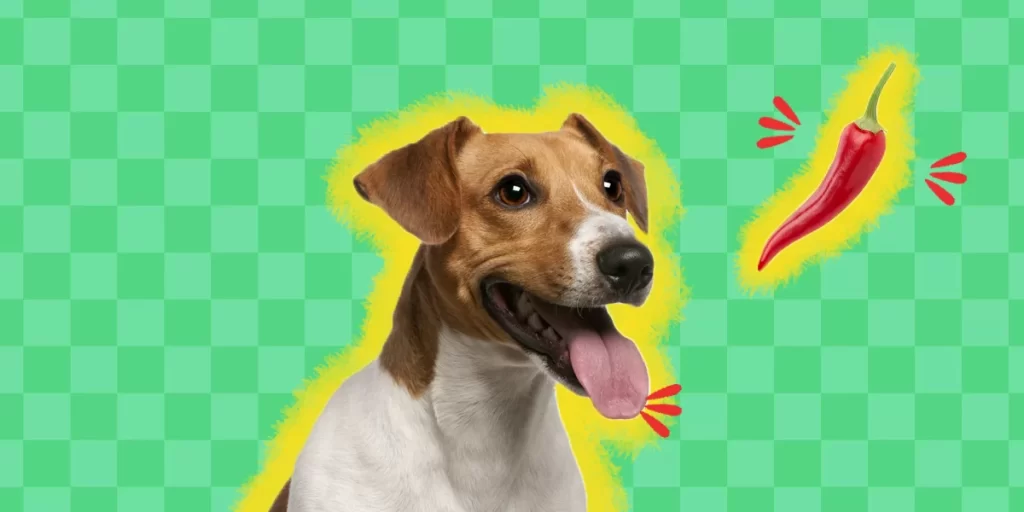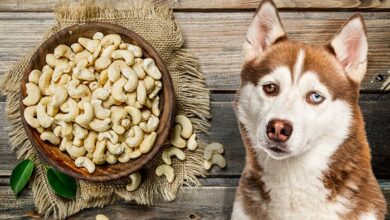Can Dogs Eat Spicy Food? A Guide to Safe Snacking at 2024

Can Dogs Eat Spicy Food? It’s important to know that spicy foods can be quite dangerous for your dog. Dogs are much more sensitive to capsaicin, the compound responsible for the heat in spicy foods, which can cause irritation in their mouth and throat.

This irritation often leads to excessive drooling and can upset their stomach, resulting in vomiting, diarrhea, and stomach pain. To ensure your dog stays healthy and happy, avoid giving them spicy foods and stick to treats that are safe for their digestive system.Let’s explore how can dogs eat spicy food.
Recognizing Signs Your Dog Has Eaten Spicy Food
Can Dogs Eat Spicy Food? What happens if dogs eat spicy food? If your dog has accidentally consumed spicy food, it’s essential to recognize the signs of discomfort and distress. Identifying these symptoms early can help you take appropriate action to address any issues and ensure your dog’s well-being.
Immediate Signs
- Pawing at the Mouth: One of the first indicators that your dog has eaten something spicy is pawing at their mouth. This behavior often signals irritation or discomfort in their mouth and throat.
- Coughing: Spicy food can cause a burning sensation that may lead to coughing. Your dog might cough to relieve the irritation caused by the heat.
- Gagging: Gagging can occur as a reaction to the spicy food, especially if it has caused discomfort or an urge to expel the irritant from their system.
Digestive Issues
- Vomiting: Vomiting is a common response to spicy foods and usually happens within a few hours of ingestion. It’s the body’s way of removing the irritant from the stomach.
- Diarrhea: Spicy foods can lead to diarrhea as the digestive system reacts to the irritation. Watch for loose stools and frequent trips outside, which indicate gastrointestinal distress.
Behavioral Changes
- Restlessness: Your dog may become restless or agitated as they experience discomfort. This behavioral change is often a sign that something is bothering them.
- Whining: Increased whining or vocalization can indicate pain or discomfort. If your dog is whining more than usual, it could be related to the effects of the spicy food.
- Loss of Appetite: A decrease in appetite or refusal to eat can signal digestive upset or oral discomfort caused by spicy foods.
By being attentive to these signs, you can take quick action to address your dog’s discomfort and seek veterinary care if necessary. Monitoring your dog’s condition and providing appropriate treatment helps ensure their health and well-being following accidental ingestion of spicy food and be aware about can dogs eat spicy food.
Safe Snacking: What to Avoid in Your Dog’s Diet
Ensuring your dog’s diet is free from spicy or harmful ingredients is key to maintaining their health and comfort. Here’s a details avout can dogs eat spicy food and what to avoid to keep your dog safe from the adverse effects of spicy foods:
Avoid Spicy Ingredients
- Chili Peppers: Foods containing chili peppers are a major no-no. These peppers have high levels of capsaicin, which can irritate your dog’s digestive system and cause significant discomfort.
- Hot Sauce: Any type of hot sauce, including those used in cooking or as a condiment, should be kept away from your dog. The spicy compounds can lead to digestive distress and other health issues.
- Spicy Seasonings: Steer clear of foods seasoned with spices such as cayenne pepper, paprika, or chili powder. These seasonings can cause irritation and are not suitable for dogs.
Avoid Leftovers or Scraps
- Seasoned Leftovers: Do not feed your dog leftovers or scraps that might be seasoned with spices. Even small amounts of spicy ingredients can cause adverse reactions in your pet.
- Food Preparation: When preparing meals, ensure that any scraps or leftover food are not accessible to your dog. Proper disposal of seasoned food helps prevent accidental ingestion.
Check Packaged Snacks
- Hidden Spices: Be cautious with packaged snacks or treats, as they may contain hidden spices or flavorings. Always check the ingredient list to ensure that the treats are free from spicy or harmful components.
- Safe Treats: Opt for dog-specific treats that are labeled as safe and suitable for your pet’s dietary needs. These treats are formulated to be gentle on your dog’s digestive system.
By avoiding these potential hazards, you can ensure that your dog’s snacks are both safe and healthy. Keeping a watchful eye on the fact that can dogs eat spicy food and their diet and avoiding spicy or seasoned foods will help prevent discomfort and maintain your dog’s overall well-being.
Healthy and Safe Alternatives to Spicy Foods-Can Dogs Eat Spicy Food
If you want to treat your dog to something special without risking their health, consider these safe and nutritious alternatives to spicy foods. These options ensure your pet enjoys tasty snacks while avoiding any discomfort or digestive issues.
Offer Dog-Friendly Treats
- Plain, Cooked Meats: Provide your dog with plain, cooked meats like chicken, turkey, or beef. These are excellent sources of protein and are gentle on your dog’s digestive system when prepared without seasoning.
- Unseasoned Vegetables: Offer cooked vegetables such as carrots, green beans, or sweet potatoes. These can be nutritious, low-calorie treats that are easy on your dog’s stomach and free from harmful spices.
Use Mild Herbs for Flavor
- Parsley: Parsley is a safe herb that can add a touch of flavor and help freshen your dog’s breath. Use it sparingly to enhance their food without introducing any spiciness.
- Basil: Basil provides a mild, aromatic flavor and is generally safe for dogs. It can be a great way to add a bit of variety to their diet without causing any harm.
- Mint: Fresh mint can be used in moderation to offer a refreshing taste. It also has digestive benefits and helps soothe the stomach.
Choose Commercial Dog Treats
- Gentle on the Stomach: Select commercial dog treats specifically designed for sensitive stomachs. These treats are formulated to be both flavorful and gentle, avoiding ingredients that could cause digestive issues.
- Quality Ingredients: Opt for treats with high-quality, natural ingredients and free from artificial additives or excessive seasonings. This ensures your dog gets a tasty treat that supports their overall health.
By incorporating these safe and healthy alternatives into your dog’s diet, you can provide enjoyable snacks while keeping their digestive system in check. Choosing appropriate treats helps maintain your dog’s well-being and avoids the risks of can dogs eat spicy food and associated with spicy foods.
How to Handle Accidental Ingestion of Spicy Food
If your dog accidentally ingests spicy food, taking immediate action is crucial to minimize discomfort and prevent health issues. Here’s how to handle the situation effectively:
Provide Fresh Water Immediately
- Flush Out the Spice: Offer your dog fresh water as soon as possible. Drinking water helps dilute and flush out the capsaicin, the compound responsible for the spiciness, from their system.
- Encourage Drinking: Make sure your dog has access to plenty of water. Encouraging them to drink can help soothe the irritation caused by the spicy food.
Observe for Symptoms
- Watch for Vomiting: Monitor your dog for any signs of vomiting, which may occur as their body tries to expel the irritant. Vomiting often happens within a few hours of ingestion.
- Check for Diarrhea: Look for symptoms of diarrhea, including loose stools and frequent trips outside. This is a common reaction to gastrointestinal irritation.
- Notice Excessive Drooling: Excessive drooling can indicate oral discomfort or irritation. Keep an eye on your dog for any unusual drooling or changes in behavior.
Contact Your Veterinarian
- Severe Discomfort: If your dog shows severe signs of discomfort, such as persistent vomiting, diarrhea, or signs of distress, contact your veterinarian immediately.
- Ongoing Issues: If symptoms persist or worsen despite initial treatment, seek veterinary care to ensure your dog receives appropriate medical attention and care.
By promptly addressing the situation and monitoring your dog’s health, you can help manage the effects of accidental ingestion of spicy food and ensure their well-being. Taking these steps will help alleviate discomfort and prevent more serious health issues.
Tips for Preventing Future Spicy Snacking Incidents
To keep your dog safe from the harmful effects of spicy foods, taking preventive measures is essential. Here are some practical tips to help you avoid future incidents and ensure your dog’s diet remains safe:
Store Spicy Foods Securely
- Safe Storage: Keep all spicy foods in a secure location that is out of your dog’s reach. Use sealed containers or high cabinets to prevent accidental access.
- Proper Disposal: Dispose of any spicy food scraps or leftovers in tightly sealed trash bins to avoid tempting your dog.
Educate Household Members and Guests
- Raise Awareness: Inform everyone in your household about the dangers of feeding dogs spicy food. Make sure they understand the potential health risks associated with spicy ingredients.
- Set Guidelines: Establish clear rules for handling and sharing food around your dog. Ensure that no one feeds your pet human food, especially anything spicy or seasoned.
Train Your Dog to Avoid Begging
- Counter-Surfing Prevention: Train your dog to avoid begging at the table or counter-surfing. Use positive reinforcement to discourage them from seeking out or accessing human food.
- Provide Alternatives: Offer your dog their own treats and food to keep them satisfied and reduce their interest in scavenging. Regularly reward good behavior to reinforce their training.
By implementing these preventive strategies, you can significantly reduce the risk of your dog accidentally consuming spicy foods. Ensuring a safe environment and educating those around you helps protect your dog from the discomfort and health issues associated with spicy snacks.




